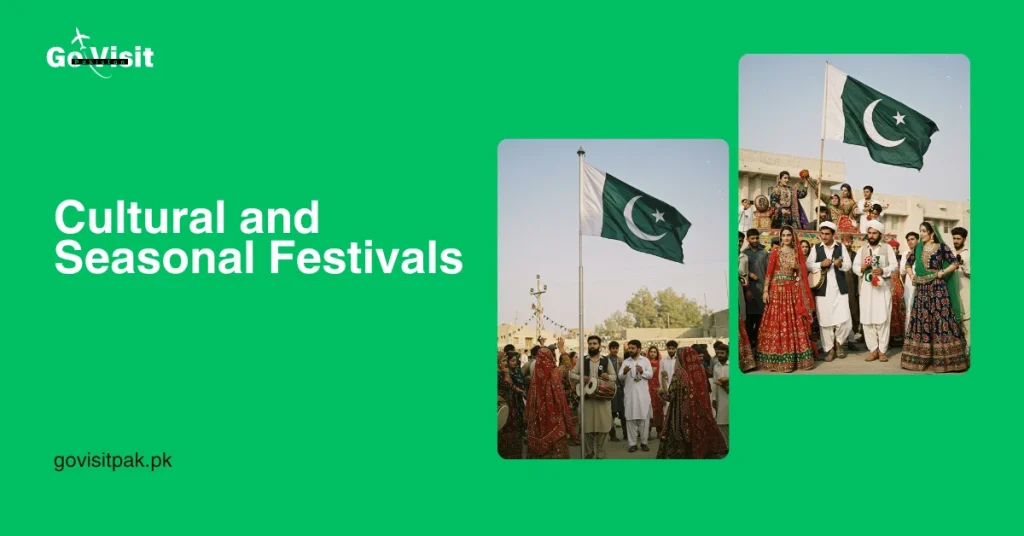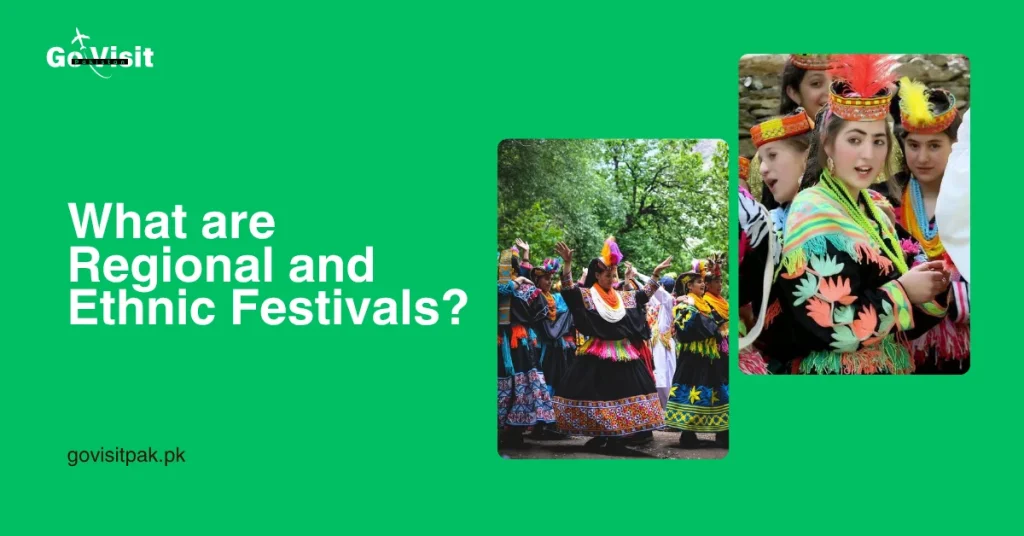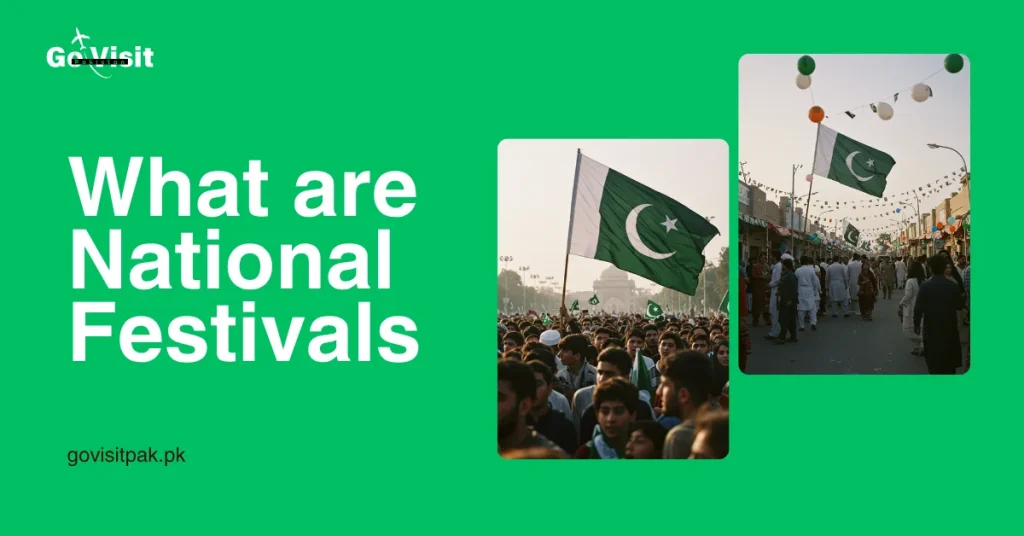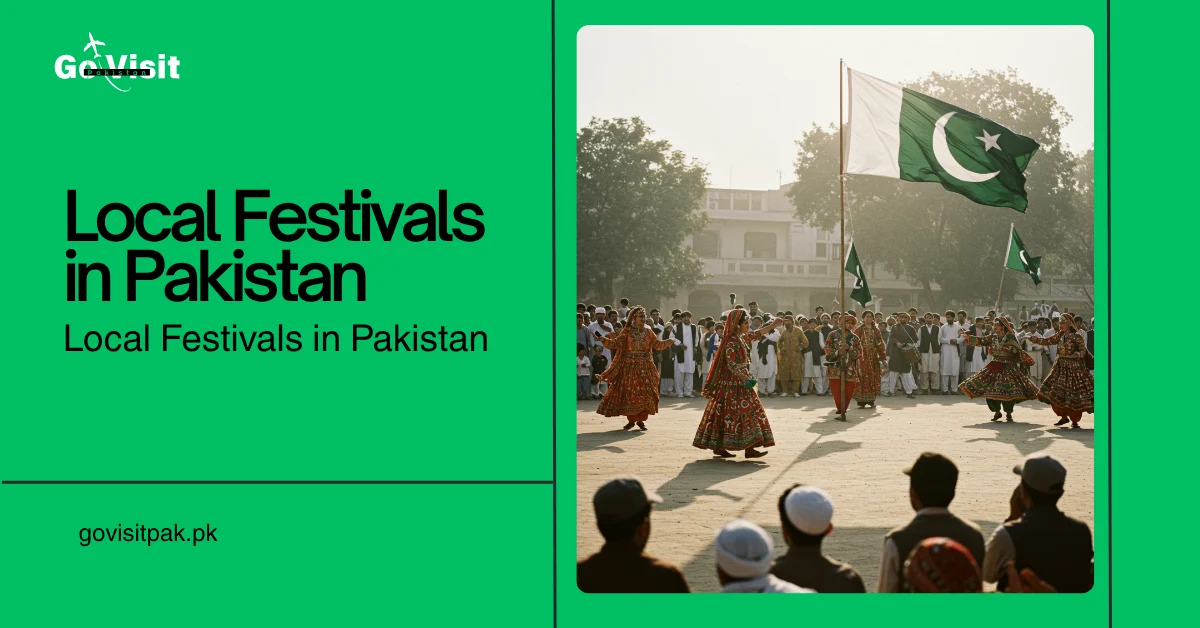You will learn about the colorful local festivals celebrated all over Pakistan through this article. Local festivals mirror the religious convictions, cultural tradition, and nationalism of the country.
The article discusses prominent religious festivals such as Eid-ul-Fitr, Eid-ul-Adha, and Milad-un-Nabi which unite people on the basis of prayers, meetings, and traditions.
It also emphasizes cultural celebrations like Basant, Lok Mela, and the Shandur Polo Festival, representing the country’s seasonal and cultural celebrations.
It even emphasizes national and regional festivals like Sindhi Cultural Day and Independence Day, emphasizing unification and heritage. Modern celebrations like food and music festivals are emphasized in the article too, i discussion at Local Festivals in Pakistan representing a situation as a whole of Pakistani celebratory enthusiasm.
Pakistan is a country rich in culture, tradition, and festivities. People from every corner of the country gather during the year and celebrate different festivities that reflect their religious faith, cultural values, and national spirit. These celebrations bring people into happiness, consolidate communities further, and give a glimpse of Pakistan’s rich culture.
Religious festivals such as Eid-ul-Fitr and Eid-ul-Adha bring families together, praying and celebrating. Cultural festivals such as Basant and Lok Mela celebrate the country’s culture and seasonal traditions.
Provincial festivals expose one to the varied practices of provinces, whereas national festivals such as Independence Day inspire patriotism in hearts.
Modern events like food and music festivals are also becoming popular and attracting tourists and youths. Whether it is Eid’s joy, kite-flying’s enthusiasm, or the national days’ pride, the festivals of Pakistan portray unity, joy and love for heritage.
The people unite through the festivals, establish memories that they will carry through their entire lifetime and give life to the heritage of their country.
What are Religious Festivals?
Religious festivals are very important in Pakistan, where the majority of people are Muslims. The festivals are celebrated with piety, prayers, and reunions that promote community ties.
People prepare for religious festivities enthusiastically. The bazaars and markets are aglow with lights, and the people shop for new clothes, gifts, and special food.
The mood of generosity and charity is high, as many give to charity and help those who are less fortunate. Mosques and houses are adorned in beautiful decorations, which bring about the festive mood.
These festivities unite individuals, irrespective of their origin. Friends and families call on each other, showering one another with love and generosity. Religious holidays also remind them of belief, thanksgiving, and benevolence.
These festivals unite people, irrespective of their culture. Relatives and friends meet each other and exchange love and kindness. These religious festivals are also a reminder of spirituality, thankfulness, and benevolence. They instill values of harmony, peace, and charity in people and are thus an essential aspect of Pakistani life.
Eid-ul-Fitr – The Festival of Happiness
Eid-ul-Fitr is a joyous occasion that marks the end of Ramadan, a month of fasting and spiritual reflection. Families begin their day with special prayers at the mosque, seeking blessings for prosperity and well-being.
After prayers, they exchange greetings, distribute gifts, and prepare delicious sweets like sheer khurma and samosas. Children receive “Eidi” (money or gifts) from elders as a token of love. The festival promotes unity, as people visit relatives and help the less fortunate by giving charity, ensuring that everyone shares in the celebrations.
Eid-ul-Adha – The Festival of Sacrifice
Eid-ul-Adha honors the devotion of Prophet Ibrahim (A.S.), who was willing to sacrifice his son in obedience to Allah. Muslims commemorate this event by sacrificing animals such as goats, cows, and camels.
The meat is divided into three parts—one for family, one for relatives and friends, and one for the underprivileged. This festival emphasizes compassion, generosity, and gratitude. It is also a time for grand feasts, where families prepare traditional dishes like kebabs and biryani, strengthening social and familial ties.
Milad-un-Nabi – Celebrating the Birth of Prophet Muhammad (PBUH)
Milad-un-Nabi is a significant festival celebrating the birth of Prophet Muhammad (PBUH). Mosques, streets, and homes are decorated with lights and green flags. Special gatherings are held where scholars discuss the Prophet’s life, teachings, and his message of kindness and peace.
People distribute sweets, food, and gifts to spread joy among the community. Many individuals also engage in charity work, following the Prophet’s example of helping the needy. The festival fosters a sense of unity and deepens the love for the Prophet among Muslims.
Ashura (Muharram) – A Time of Reflection
Ashura falls on the 10th of Muharram and is observed with great reverence, particularly by Shia Muslims, who mourn the martyrdom of Imam Hussain (A.S.) and his companions at the Battle of Karbala. Processions, gatherings, and recitations of poetry are organized to honor their sacrifice.
Sunni Muslims also observe Ashura by fasting, as it is believed that Prophet Musa (A.S.) and his followers were saved from Pharaoh on this day. It is a day of remembrance, patience, and devotion, reminding Muslims of the importance of standing for justice and truth.
Cultural and Seasonal Festivals
Pakistan is home to vibrant cultural festivals that celebrate nature, arts, and traditions. These events bring communities together and highlight the country’s rich heritage. During the year, various parts of the country celebrate festivals that are specific to their traditions.

These festivals are not only for entertainment purposes but also for maintaining history and linking people to their heritage. People from all over Pakistan and even abroad visit these festivals to witness the rich diversity of Pakistani culture.
Most cultural festivals include handicraft exhibitions, food stalls, and music performances, providing an opportunity for performers and artisans to display their talents. The celebrations are a cause of happiness and pride, and they unite people in a community closer than before and create lifelong memories.
Basant Festival – The Kite-Flying Festival
Basant was once one of the most popular festivals in Pakistan, especially in Lahore. It marked the arrival of spring with colorful kites filling the sky. Families and friends gathered on rooftops to participate in friendly kite battles, while music and food stalls added to the festive atmosphere.
Unfortunately, Basant was banned due to safety concerns, but many still hope for its return under strict regulations. If revived with proper safety measures, it could once again become a significant celebration of joy and festivity.
Lok Mela (Lok Virsa Festival) – A Celebration of Folk Traditions
Lok Mela is an annual cultural festival held in Islamabad, showcasing the diverse traditions of Pakistan’s provinces. Folk artists, craftsmen, and musicians gather to display their talents. Visitors enjoy traditional music, handicrafts, and authentic regional cuisines.
The festival provides artisans with a platform to promote their work and helps preserve Pakistan’s cultural heritage. Families and tourists attend this event to witness the beauty of the country’s folk traditions.
Shandur Polo Festival – The Highest Polo Ground in the World
Held in the breathtaking Shandur Pass in Gilgit-Baltistan, this festival features a thrilling polo match between the teams of Chitral and Gilgit. The festival attracts adventure seekers, tourists, and sports enthusiasts from across the world.
Alongside the polo matches, there are cultural performances, traditional dances, and folk music. The scenic landscape, with snow-capped mountains in the background, makes this festival an unforgettable experience.
Sibi Mela – A Grand Livestock and Cultural Festival
Sibi Mela, one of Pakistan’s oldest festivals, takes place in Balochistan. Originally a livestock fair, it has evolved into a grand event featuring camel and horse races, traditional music, and cultural exhibitions.
Farmers, traders, and visitors from all over Pakistan participate in this event, making it an important occasion for economic and social interactions. The festival highlights the rich traditions of Balochistan while also serving as a marketplace for livestock and agricultural products.
What are Regional and Ethnic Festivals?
Different regions in Pakistan celebrate unique festivals that highlight their local cultures and traditions. These festivals reflect the vibrant history, traditions, and way of living of different ethnic groups throughout the nation. Each festival has special meaning in uniting people in vibrant and festive celebrations.

Most of these festivals are associated with seasonal changes, historical events, or religious faith, and therefore are closely embedded in the lifestyle of the locals. They enhance harmony, diversity, and cultural heritage pride. People share their traditions with future generations through these festivals, and their customs live on.
Chilam Joshi Festival
The Joyful Festival of Kalash People. The Chilam Joshi Festival is a vibrant event celebrated by the Kalash people in the Chitral Valley. It marks the arrival of spring and is filled with music, dance, and traditional rituals.
Women wear colorful embroidered dresses, and men participate in lively dances. The festival is a major attraction for tourists, as it provides a rare glimpse into the unique customs of the Kalash people. Visitors are welcomed with open arms and invited to take part in the celebrations.
Baba Guru Nanak Jayanti – A Holy Sikh Festival
This festival commemorates the birth of Baba Guru Nanak, the founder of Sikhism. Thousands of Sikh devotees travel to Nankana Sahib and Kartarpur in Pakistan to participate in prayers and celebrations.
The event is marked by religious hymns, processions, and community meals (langar) served to all, regardless of faith. Pakistan’s efforts to facilitate Sikh pilgrims, such as the Kartarpur Corridor, highlight the country’s commitment to religious harmony.
Sindhi Cultural Day – Celebrating Sindh’s Rich Heritage
Sindhi Cultural Day is celebrated with great enthusiasm in Sindh. People wear traditional Ajrak and Sindhi topi, sing folk songs, and organize rallies showcasing Sindhi heritage.
The event promotes provincial pride and cultural awareness. Schools and organizations arrange special programs featuring Sindhi poetry, music, and dance performances.
Baloch Culture Day – A Salute to Balochi Heritage
Baloch Culture Day celebrates the traditions and customs of Balochistan. People dress in traditional Balochi attire, perform folk dances, and conduct cultural exhibitions. The event serves as a reminder of Balochistan’s rich history and unique identity within Pakistan.
What are National Festivals?
Pakistan’s national festivals remind people of their country’s history, independence and unity. These festive occasions celebrate the selfless acts by leaders and citizens in the fight for freedom and development. They enhance patriotism and unite people in festivities.

Festivals at a national level are celebrated with ceremonies, parades, and cultural events throughout the nation. Communities, government buildings, and educational institutions host functions to make young generations aware of Pakistan’s traditions.
Festivals are also moments to recall achievements of the country and reaffirm the determination for development and national unity.
Pakistan Day (23rd March)
Pakistan Day marks the passing of the Lahore Resolution in 1940, which paved the way for the creation of Pakistan. The day is celebrated with military parades, flag hoisting, and ceremonies across the country. Schools and government institutions organize special programs to educate people about Pakistan’s history and struggles for independence.
Independence Day (14th August)
Pakistan’s Independence Day is celebrated with enthusiasm across the nation. People decorate homes and streets with green and white flags, participate in parades, and attend fireworks displays. The day serves as a reminder of the sacrifices made for Pakistan’s freedom.
Defence Day (6th September)
Defence Day commemorates the bravery of Pakistan’s military forces, particularly during the 1965 war. The day is observed with military parades, tributes to soldiers, and exhibitions showcasing Pakistan’s defense capabilities.
Quaid-e-Azam Day (25th December)
On 25th December, Pakistan honors the birthday of its founder, Quaid-e-Azam Muhammad Ali Jinnah. Special events and ceremonies take place across the country, reflecting on his vision and leadership.
Shandur Polo Festival
Shandur Polo Festival is the highest-altitude polo festival in the world. It is held each July between Gilgit-Baltistan and Chitral.
- The festival is characterized by polo matches played freely without any rule. Local people and foreign visitors join this thrill-seeking event.
- The stunning snow-covered mountains increase the beauty of the festival.
- Besides polo, cultural shows and folk music captivate visitors.
- The Pakhtoon and Gilgit-Baltistan people are featured at this festival.
- Food stalls that carry traditional cuisine provide food for participants.
- Bonfires and native dance activities complement the beauty of the festival.
- It is a trip of a lifetime for thrill seekers despite the arduous trek to Shandur.
- Lahooti Melo is a colorful festival to commemorate Sindhi and indie music. Tharparkar’s Marvi Festival features folktales and cultural heritage.
These festivals take Pakistan’s multicultural traditions to the world.
Kalash Festival Dates
The Kalash people enjoy three major festivals every year. Chilam Joshi occurs in May, with flower rituals and dance. Uchal Festival in August honors the harvest season.
Choimus, which occurs in December, celebrates the end of the year with prayers and music.
These festivals showcase the independence and rich heritage of Kalash culture. Tourists come to witness the vibrant celebrations and breathtaking scenery.
Kalash people dress in traditional black attire with colorful headpieces during the festivals. Music and dance are integral components of these festivals.
Local and international tourists visit Kalash Valley to see these festivals. These festivals highlight one of Pakistan’s most distinctive and oldest cultures.
Religious Festivals in Pakistan
Individuals of various religions celebrate their religious festivals in Pakistan. There are Muslim festivals like Eid-ul-Fitr, Eid-ul-Adha, and Milad-un-Nabi.
Ashura and Chehlum are celebrated in remembrance of Imam Hussain (R.A).
Mela Chiraghan is a popular Sufi festival in Lahore at the shrine of Madho Lal Hussain.
The Hindu community celebrates Holi, Diwali, and Janmashtami with fervor.
Christmas and Easter are celebrated by Christians with devotion.
The Sikh community celebrates Guru Nanak’s birthday and Baisakhi.
Buddhist heritage festivals take place at old temples in Taxila and Gilgit.
These consist of religious rites, prayers, and public congregations.
They demonstrate Pakistan’s religious tolerance and peaceful coexistence.
Sindh Cultural Festival
The Sindh Cultural Festival celebrates Sindhi heritage and traditions.
It promotes Sindhi topi, Ajrak, and traditional handicrafts. Folk music, in the form of Allan Faqir and Abida Parveen performances, is showcased. Local and foreign tourists travel to Sindh to experience this colorful event.
The festival takes place at historical places such as Mohatta Palace and Thatta.
Sindhi food, such as Sajji and Bhajis, is served from food stalls. The festival showcases Sindh’s Sufi poetry and cultural heritage.
Folk performances and traditional dances mesmerize the crowd. One can also organize tours of historic Sindhi cities such as Bhambore and Makli. This festival highlights the rich heritage and cultural pride of Sindh.
Heritage Festivals in Pakistan
Heritage festivals in Pakistan honor the nation’s rich cultural and historical heritage. Lok Virsa Festival in Islamabad honors traditional arts and crafts.The Sindh Cultural Festival celebrates Sindhi heritage, such as Ajrak and Sindhi music.
Shandur Polo Festival is a centuries-old celebration in Gilgit-Baltistan.Mela Chiraghan is a popular Sufi festival that takes place at the shrine of Madho Lal Hussain.
The Urs of Shah Abdul Latif Bhittai is marked with poetry and Qawwali.
Lahooti Melo in Sindh supports cultural music and narration.
The Desert Festival features the way of life of the desert folk.
Heritage festivals maintain Pakistan’s heritage legacy through performances and exhibitions.
These events attract tourists and history enthusiasts from all over the world.
Pakistani Festival Celebrations
Festivals in Pakistan are celebrated with enthusiasm and traditions.
Eid-ul-Fitr and Eid-ul-Adha are marked with prayers, feasts, and charity.
Independence Day is celebrated with flag hoisting and parades.
Basant, though banned in many places, was once a major kite-flying festival.
Mela Chiraghan involves candlelight and religious congregations.
Shandur Polo Festival is a sporting festival at a high altitude with cultural performances.
Navroz is celebrated by the Persian and Ismaili people with traditional rites.
The Urs of prominent Sufi saints involves Qawwali and spiritual ceremonies.Christmas and Diwali are promoted by Christian and Hindu populations.These festivals depict the rich cultural and religious diversity of Pakistan.
Pakistani Food Festivals
Food festivals in Pakistan are a confluence of various culinary experiences.
Lahore Eat Festival is one of the largest food festivals in the nation.Karachi Eat Festival is popular among food enthusiasts with a mix of cuisines.
Islamabad Food Festival features local and international cuisine.The Punjab Food Festival features traditional Punjabi food. Sindh Cultural Festival features Sindhi Biryani and other local food.
Street food festivals are held to celebrate snacks such as Gol Gappay and Bun Kebab. Food festivals also involve live cooking demonstrations and competitions. Ramadan Iftar festivals feature special foods during the holy month.
These festivals showcase Pakistani cuisine and draw food lovers.
Punjab Traditional Festivals
Punjab is famous for its colorful traditional festivals. Basant was formerly a grand spring celebration observed by flying kites.Mela Chiraghan takes place at the shrine of Sufi saint Madho Lal Hussain.
The Urs of Data Ganj Bakhsh in Lahore draws thousands of pilgrims. Lahore Literary Festival encourages Punjab’s cultural and literary history.
The Cholistan Desert Rally mixes adventure with cultural events. Jashn-e-Baharan is the celebration of spring through floral arrangements. Sufi music festivals in Punjab emphasize Punjab’s spiritual heritage. Horse and cattle shows are also a part of Punjabi rural festivals. The festivals reflect Punjab’s rich cultural and traditional heritage.
Festivals in Pakistan by Region
Every region of Pakistan has its own distinct festivals. Sindh Cultural Festival is the celebration of Sindhi culture with music and dance. Kalash Chilam Joshi Festival celebrates the onset of spring.
Sibi Mela in Balochistan is among the oldest cultural festivals in the nation.
Shandur Polo Festival is a legendary festival in Gilgit-Baltistan.The Thar Desert Festival showcases the culture of Thar people.
Mela Chiraghan in Punjab is a renowned religious and cultural festival. Jashn-e-Chitral in Khyber Pakhtunkhwa includes traditional sports and music. Every region’s festival is a reflection of its history, lifestyle, and traditions. Regional festivals encourage cultural unity and diversity in Pakistan.
Seasonal Festivals in Pakistan
Pakistan celebrates festivals season-wise. Basant was a popular spring festival in Punjab with kite flying. Chilam Joshi Festival is the beginning of spring in the Kalash Valley. Shandur Polo Festival takes place during summer in Gilgit-Baltistan.
Jashn-e-Baharan is a celebration of spring beauty through floral shows.
Thal Desert Festival is a winter festival that promotes desert culture.
Ramadan and Eid festivals are according to the Islamic lunar calendar.
The Urs of renowned saints is observed at various times of the year. Christmas and Diwali are also celebrated by Christian and Hindu communities.
Seasonal celebrations and festivals are a source of joy throughout the year. The events depict the beauty of seasons and nature.
Festivals of Tourism in Pakistan
Festivals of tourism invite travelers to Pakistan’s scenic and cultural destinations. The Shandur Polo Festival is a great crowd-puller for adventure sport tourists.
Chilam Joshi Festival attracts tourists to picturesque Kalash Valley. The Thar Desert Festival features the desert’s distinct culture.
Lahooti Melo in Sindh encourages local arts, music, and tourism. The Gilgit-Baltistan Tourism Festival features the natural beauty of the region.
Pakistan Tourism Summit encourages travel spots throughout the country.
The Malam Jabba Snow Festival welcomes winter sports enthusiasts.
The Cholistan Desert Rally features racing with cultural activities.
These festivals help boost Pakistan’s tourism industry. Visitors experience the country’s heritage, landscapes, and traditions.
Conclusion
Festivals in Pakistan make people happy, unite people, and preserve traditions. Religious festivals demonstrate faith and piety, whereas cultural festivals commemorate history and traditions.
These festivals bring people together and also draw tourists who wish to witness Pakistan’s beauty and culture.
They provide an opportunity to share traditions with the world and promote a positive image of Pakistan. Festivals strengthen family bonds, as people gather, exchange gifts, and enjoy traditional foods.
Whether it is the thrill of Basant, the happiness of Eid, or the pride of Independence Day, each festival is special in its own way. Celebrating these festivals reminds us of the value of unity, culture, and collective happiness.
FAQs
Which is the most popular festival in Pakistan?
Eid-ul-Fitr and Eid-ul-Adha are the two most popular festivals in Pakistan. Individuals celebrate Eid-ul-Fitr upon the completion of Ramadan with prayers, food, and gathering with family. Eid-ul-Adha is all about giving and charity by sacrificing animals. Basant was a vibrant kite-flying festival, but it was prohibited due to safety concerns. Independence Day on 14th August is also quite significant, as it teaches people of Pakistan about their nation’s freedom and history.
Are local festivals in Pakistan open to tourists?
Yes, many festivals in Pakistan welcome tourists. Events like Lok Mela, Chilam Joshi, and the Shandur Polo Festival are great places to see Pakistan’s culture and traditions. Tourists enjoy folk music, dance, and delicious local food at these festivals. Many visitors travel to Pakistan to experience these celebrations and learn about its diverse heritage.
Why was Basant banned in Pakistan?
Basant was prohibited because there were some who employed hazardous kite strings and injured others. There were a lot of accidents, so the government prohibited the festival. Even today, people want Basant to come back with proper safety guidelines. It was a happy festival with families and friends flying colorful kites to celebrate the arrival of spring before it was prohibited.
Which province has the largest number of cultural festivals?
Sindh and Punjab also boast cultural festivals but have specific ones peculiar to each province. The most famous of them are Sindhi Cultural Day and Lok Mela in Sindh, Basant and Mela Chiraghan in Punjab. Balochistan enjoys the day of Baloch Culture Day, and Gilgit-Baltistan features the Shandur Polo Festival, the country’s pride. Chilam Joshi Festival is the pride of the Kalash people of Khyber Pakhtunkhwa.
Are international festivals celebrated in Pakistan?
Yes, Pakistan does observe some international festivals.
New Year’s Eve is enjoyed by individuals from major cities such as Karachi, Lahore, and Islamabad with fireworks and parties. Christmas is observed by Christians nationwide. Halloween, Valentine’s Day, and Mother’s Day are also celebrated by youth. Though these festivals are not as frequent as local ones, they are gaining popularity, particularly in cities.





